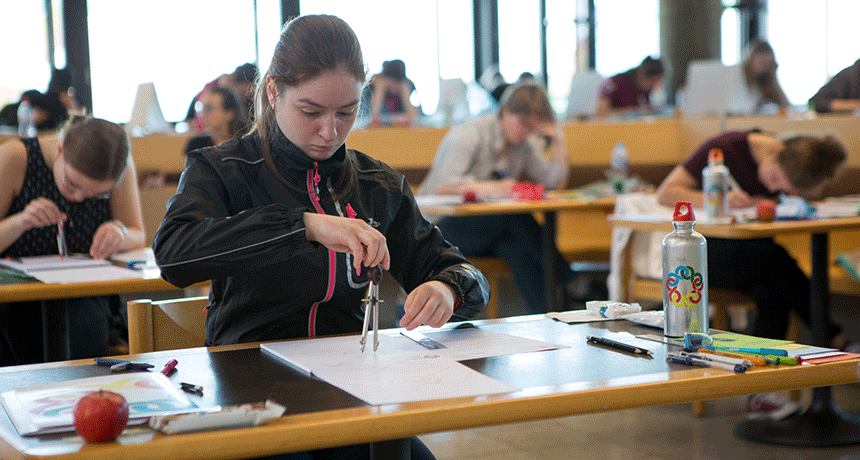Math isn’t just for boys
Unfortunately, too many girls have yet to get that message

More than 150 girls from around the world competed in the 2017 European Girls’ Mathematical Olympiad in Zurich, Switzerland.
Evelyn Merkli/European Girls’ Mathematical Olympiad/Flickr (CC-BY-NC 2.0)
In 2015 and 2016, a U.S. team won the high school Olympics of math. Yet something was missing from both six-member teams: girls.
This isn’t an unusual occurrence at the International Mathematical Olympiad (IMO). But it is a problem.
Girls are under-represented at math competitions, generally. For instance, 108,137 middle-school students took part in the 2016 AMC 8. This American Mathematics Competition (AMC) is for eighth-grade and younger students. Girls represented fewer than half — only about 44 percent of the contestants. And that number actually is pretty high for such events. For instance, the American Invitation Mathematics Exam is another AMC program. Participation in it is by invitation only. Qualifying high-school students must have received a top score on the AMC 10 or the AMC 12. Of the 3,223 students who took part on the main event date, this year, just 443 were girls. That comes to roughly 14 in every 100 participants.
These numbers are striking because girls can be just as good at math as boys are. But somehow, many girls pick up the idea that math isn’t for them. And not only do they enter competitions less often than boys do, but they also are less likely to pursue math-related careers. In fact, just one in every four U.S. workers in math and computer-science fields is a woman.
Outdated stereotypes may be part of the problem.
Stereotypes are beliefs about entire groups of people that are based more on feelings than facts. One persistent stereotype is that girls aren’t good at math. Stereotypes can be very harmful. They can damage a person’s self-image and also limit the opportunities they receive. This may occur despite an individual’s abilities, skills and potential.
When it comes to girls and women being under-represented in math, “the trouble is a cultural one. It’s a perception thing,” says Randall Cone. He is a mathematician and computer scientist at Salisbury University in Maryland. This perception affects how many — or how few — women study advanced math and find jobs in fields that rely on math skills.
But the problem is more complex that just stereotypes. In 2009, two researchers at the Massachusetts Institute of Technology in Cambridge investigated why fewer girls than boys rise to the top levels of math competitions. They looked at data from AMC events. Hoping to better understand this gender gap, they focused on high-achievers.
A gender gap in math indeed exists around the world, they found. However, they were not ready to say for sure why this might be. In fact, the problem is likely due to many things. But peer pressure may play a role. It might dissuade girls from joining math clubs or pursuing other activities that could help them become math superstars.
Many top-performing female mathletes in the United States came from just a few elite schools, the study found. There, students might face less peer pressure. The reason? Girls there might simply be surrounded by a larger share of other top performers working towards similar goals.

Girls have to be brave to overcome stereotypes and enter math competitions. That’s true especially when there are few other female students who enjoy math. To fight the stereotypes that math isn’t for them, “We should attract more girls at an early age to do math,” says Demi Guo, 19.
Girls need role models — ones in math competitions and anywhere else math is taught and used. Indeed, that’s why competitions such as the China Girls’ Mathematical Olympiad and the European Girls’ Mathematical Olympiad (EGMO) were created. Both are exactly like the IMO — with the exception that they are open only to girls. In fact, EGMO is one of the toughest high-school math competitions in the world.
Demi competed last year as part of the U.S. EGMO team in Bușteni, Romania. Her team won silver, and she took home an individual bronze medal. These competitions can boost the self-esteem of girls, convincing them that they have a natural place in math, including careers that rely on it. While Demi was in high school, she also competed in computer-programming meets. “I think computer-programming contests are really related to math contests,” she notes. Now she’s studying math and computer science at Harvard University in Cambridge, Mass.
“I’m not entirely sure what I’d like to do after I graduate,” she admits. She’s considering a career in research or in product design. She could imagine working at a university or in a technology-related startup company.
“Math might be hard, but it can be really rewarding,” Demi says. Yet, she points out, “You’ll never appreciate the beauty of math if you never try.”







